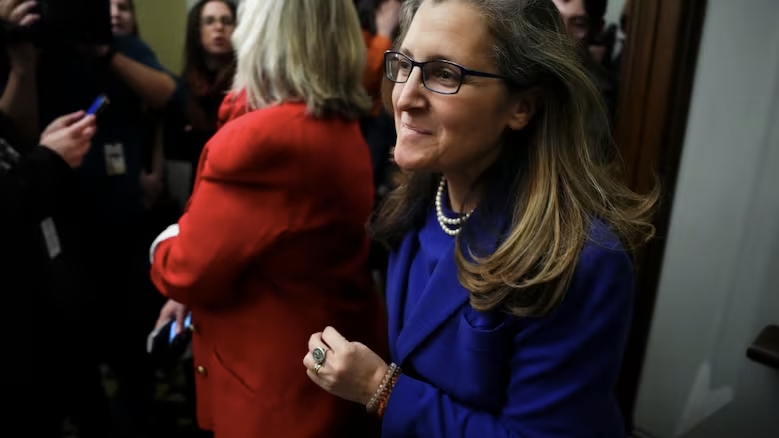Freeland Faces Mounting Deficit Pressures as Government Unveils Fall Economic Statement
Olivia Singh
12/16/20242 min read


The federal government will unveil its fall economic statement today, addressing weeks of speculation about whether Finance Minister Chrystia Freeland can deliver on her spring promise to keep the 2023-24 deficit at or below $40.1 billion. Mounting fiscal challenges and a looming trade standoff with the United States have amplified scrutiny of Ottawa's financial stewardship.
Freeland, who set three fiscal guideposts in her 2024 budget, recently signaled that meeting the deficit target may no longer be feasible. "I chose my words with care, because it is important to be clear with Canadians," she said last week, avoiding firm commitments about the deficit cap.
The announcement comes as Canada braces for economic uncertainty, with U.S. president-elect Donald Trump threatening steep tariffs on imports. While Freeland has said the update will not directly address the tariff issue, officials admit the U.S. trade stance has forced some adjustments to the fiscal roadmap.
Revised Deficit Projections
Economists widely expect Ottawa to exceed its deficit target, with estimates projecting a shortfall $10 to $15 billion higher than initially forecast. Jock Finlayson, a senior fellow at the Fraser Institute, noted, "We've seen serial slippage in meeting budget targets since the worst of the COVID crisis passed."
Another anchor at risk is the government's pledge to keep deficits below one per cent of GDP by 2026-27. New federal commitments to child care, dental care, and pharmacare have stretched the budget, though senior officials maintain that the debt-to-GDP ratio—a key fiscal measure—will remain on track. Freeland has pledged to keep that ratio at 42.1 per cent for the current fiscal year.
Balancing Trade and Productivity Challenges
The fiscal update also comes amid heightened trade tensions. Trump's proposed 25 per cent tariff on Canadian imports threatens to disrupt Canada’s economy, adding pressure to stabilize domestic investment and retain capital.
"Our focus has to be on preventing the U.S. from pulling capital out of Canada," said a senior government official, speaking anonymously. Measures to strengthen border security and improve trade resilience may be hinted at in the update, but detailed plans are expected to follow in 2024.
Economist Finlayson cautioned against focusing solely on reactive measures, pointing to Canada’s persistent productivity challenges as a greater long-term concern. "We're planting flowers in the garden while termites chew away at the foundation," he said, urging structural reforms to boost economic output.
Targeted Spending, Stalled Initiatives
Freeland has announced new measures, including incentives for secondary suites and enhancements to scientific research tax credits, as part of today’s fiscal plan. However, other proposals—such as $250 rebate cheques for middle-income Canadians—remain stalled due to a lack of parliamentary support in the minority government.
Despite the headwinds, officials say the update will prioritize affordability, housing, and economic growth, albeit without significant policy shifts. "This is about building resilience, not U-turns," a source said.
Delayed Release Raises Eyebrows
The economic update, delayed until mid-December, has drawn criticism from opposition parties who accuse Freeland of avoiding the release of potentially grim numbers. Government officials attribute the timing to parliamentary disruptions and last-minute adjustments tied to U.S. trade uncertainties.
Regardless of today’s announcements, the road ahead remains fraught. With Parliament deadlocked and international challenges mounting, the government’s ability to deliver on its promises—and maintain fiscal credibility—may hinge on how effectively it navigates the months ahead.
News
Stay updated with the latest BC news stories, subscribe to our newsletter today.
SUBSCRIBE
© 2025 Innovatory Labs Inc.. All rights reserved.
LINKS
